Related Research Articles

General Gabriele D'Annunzio, Prince of Montenevoso, sometimes written d'Annunzio as he used to sign himself, was an Italian poet, playwright, orator, journalist, aristocrat, and Royal Italian Army officer during World War I. He occupied a prominent place in Italian literature from 1889 to 1910 and in its political life from 1914 to 1924. He was often referred to by the epithets il Vate and il Profeta.
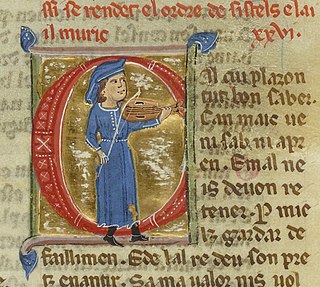
A troubadour was a composer and performer of Old Occitan lyric poetry during the High Middle Ages (1100–1350). Since the word troubadour is etymologically masculine, a female equivalent is usually called a trobairitz.

Modern lyric poetry is a formal type of poetry which expresses personal emotions or feelings, typically spoken in the first person. The term for both modern lyric poetry and modern song lyrics derives from a form of Ancient Greek literature, the Greek lyric, which was defined by its musical accompaniment, usually on an instrument known as a kithara, a seven-stringed lyre. These three are not equivalent, though song lyrics are often in the lyric mode and Ancient Greek lyric poetry was principally chanted verse.

In Italy, music has traditionally been one of the cultural markers of Italian national cultures and ethnic identity and holds an important position in society and in politics. Italian music innovation – in musical scale, harmony, notation, and theatre – enabled the development of opera and much of modern European classical music – such as the symphony and concerto – ranges across a broad spectrum of opera and instrumental classical music and popular music drawn from both native and imported sources. Instruments associated with classical music, including the piano and violin, were invented in Italy.

Italian literature is written in the Italian language, particularly within Italy. It may also refer to literature written by Italians or in other languages spoken in Italy, often languages that are closely related to modern Italian, including regional varieties and vernacular dialects.

Mario Lanza Live at the Hollywood Bowl: Historical Recordings is a 2000 CD, released by the Gala label, includes the six selections that tenor Mario Lanza sang at his first Hollywood Bowl concert on August 27, 1947. This is the performance that first brought Lanza to the attention of Hollywood, and shortly afterwards he was signed to a seven-year film contract with MGM. Included from the performance at the Bowl are six arias, three of them in duet with soprano Frances Yeend. Eugene Ormandy conducts the Hollywood Bowl Orchestra for these performances.
Italian poetry is a category of Italian literature. Italian poetry has its origins in the thirteenth century and has heavily influenced the poetic traditions of many European languages, including that of English.

Sir Francesco Paolo Tosti KCVO was an Italian composer and music teacher. Today, he is remembered mostly for his light-hearted songs, which are popular among vocal students.
Canzone napoletana, sometimes referred to as Neapolitan song, is a generic term for a traditional form of music sung in the Neapolitan language, ordinarily for the male voice singing solo, although well represented by female soloists as well, and expressed in familiar genres such as the love song and serenade. Many of the songs are about the nostalgic longing for Naples as it once was. The genre consists of a large body of composed popular music—such songs as "'O sole mio"; "Torna a Surriento"; "Funiculì, Funiculà"; "Santa Lucia" and others.
The Music of Abruzzo is a style of music in Abruzzo, Italy. Abruzzo is sparsely populated and is very mountainous, but the area has a musical history involving opera, sacred music, and even the town band. The great composer of delicate, 19th-century airs, Francesco Paolo Tosti, dedicated a series of compositions to the area, the romanze abruzzesi.
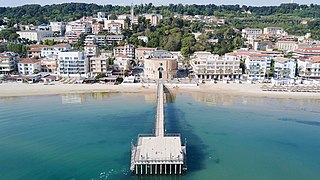
Francavilla al Mare is a comune and town in the province of Chieti, in the Abruzzo region of Italy.
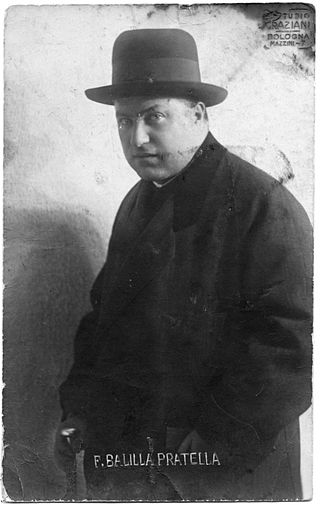
Francesco Balilla Pratella was an Italian composer, musicologist and essayist. One of the leading advocates of Futurism in Italian music, much of Pratella's own music betrays little obvious connection to the views espoused in the manifestos he authored.
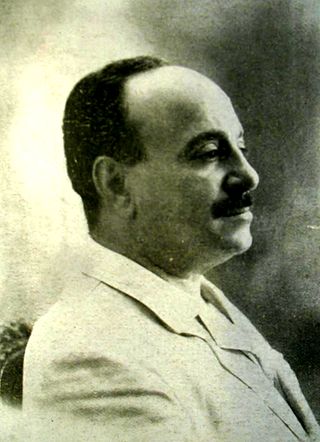
Ferdinando Russo was a prominent Neapolitan journalist primarily remembered as a dialect poet and composer of song lyrics.

Giovanni Gaeta was the real name of the Italian poet, writer and musician better known as E. A. Mario. He took the E of his assumed name from the initial letter of the pseudonym Ermes under which he wrote for the newspaper Il Ventesimo; the A came from Alessandro, the paper's chief editor; and Mario was the name of its Polish director.

Femminielli or femmenielli are a population of people who embody a third gender role in traditional Neapolitan culture. This term is culturally distinct from trans woman, and has its own cultural significance and practices, often including prostitution. This term is not derogatory; instead femminielli are traditionally believed to bring good luck.
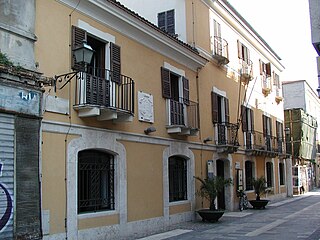
The Gabriele d'Annunzio Birthplace Museum is located at 116 Corso Manthoné in Pescara and was declared a national monument in 1927. Since December 2014, the Ministry of Cultural Heritage and Activities has managed it through the Polo Museale dell'Abruzzo, which became the Regional Directorate of Museums in December 2019.

Mario Pasquale Costa was a prolific Italian composer primarily known for his art songs, Neapolitan songs, and operettas.

Basilio Cascella was an Italian artist, active from the late nineteenth century to the mid-twentieth century.

The Bad Poet is a 2020 Italian biographical-drama film directed by Gianluca Jodice. The film is inspired by the book by the Italian journalist and writer Roberto Festorazzi, D'Annunzio e la piovra fascista, first published by Minotauro in 2005 and republished by Silicio-Editoriale Lombarda in 2020. The film focuses on the last years of the poet Gabriele D'Annunzio, played by Sergio Castellitto, and on his ambiguous relationship with fascism.

Forse che sì forse che no is a novel published in 1910 by Gabriele D'Annunzio. As all D'Annunzio's novels, Forse che sì forse che no echoes to a certain extent one of D'Annunzio's own experiences. In particular, this novel echoes D'Annunzio's summer of "erotic frenzy with Donatella [Cross]." D'Annunzio originally planned to title the novel Vertigine. He later attempted to change even Forse che sì forse che no, because they made him notice that the rhythm matched the Neapolitan popular song Funiculì, Funiculà. It is considered the "last great D'Annunzian novel."
References
- 1 2 Erminia Passannanti, "Libido e contemplazione erotica nel testo "La vucchella", di Gabriele D'Annunzio e Paolo Tosti.", Erodiade, 2014.
- ↑ "proof" . Retrieved 9 April 2016.
- ↑ The Song of A Life: Francesco Paolo Tosti (1846-1916) – Page 196 Francesco Sanvitale, Andreina Manzo – 2004 "from Tosti's wife, Berthe, addressed to D'Annunzio, dating from 7 and 14 April, show the poet's interest for ... the four Italian songs, there is also a Neapolitan one "
- ↑ Italy: documents and notes – Volume 15 – Page 456 Italy. Servizi delle informazioni e della proprietà letteraria, artistica e scientifica – 1967 "Even Gabriele D'Annunzio was attracted by this style and wrote A 'vucchella for Tosti's music, the leaping, fresh verses ... "